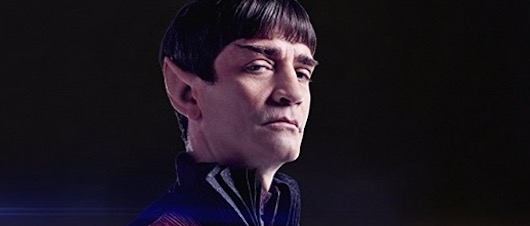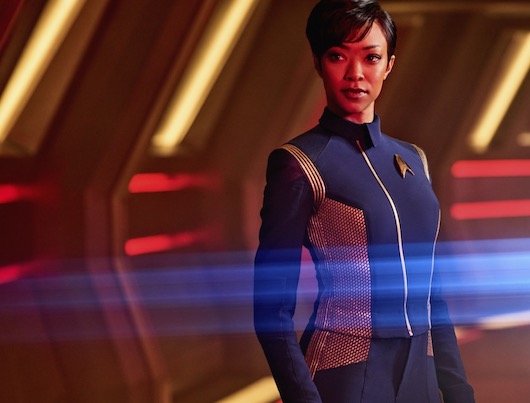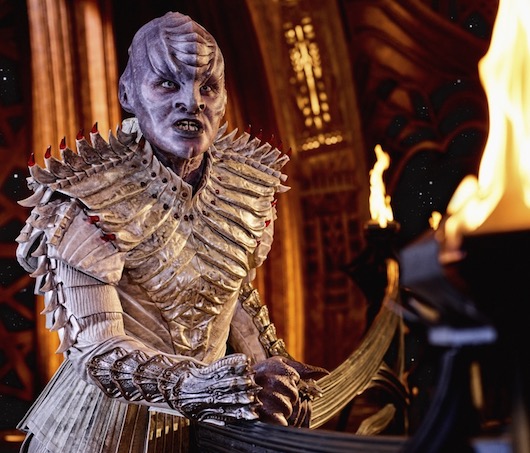 TV
TV « In Which We Pick Up Where Everything Else Left Off »
 Monday, September 25, 2017 at 9:35AM
Monday, September 25, 2017 at 9:35AM 
The Most Boring Cultural Relativism
by ETHAN PETERSON
Star Trek Discovery
creators Bryan Fuller & Alex Kurtzman
CBS

"My people were hunted, farmed," explains a science officer of the Federation somewhere in the painful two hour premiere of Star Trek Discovery. His face looks like a waffle. Everyone looks on sympathetically.
The plan for this resurrection of the Star Trek franchise was as follows. Here is what people enjoy about this moribund intellectual property: Klingons and Vulcans! Nevermind that we spent the last thirty years minimizing them and expanding the diegesis of Star Trek to include you know, actual other races and peoples. There are really only three, and who cares if they are boring and simplistic exaggerations of a peaceful and war-making race? It is going to be like Star Trek meets Orange is the New Black. We'll get Bryan Fuller to come up with story ideas — who else but the man who made cannibalism unexciting?
While Star Trek: The Next Generation was great until Brannon Braga took over, the original Star Trek series was utterly miserable to watch at the time. It only succeeded because the other only thing on television was Walter Cronkite suffering through his monthly period. A return to that era is equally distressing, a problem Bryan Fuller solves in Star Trek Discovery by showing us ten minute long scenes of the Klingons communicating with each other in subtitles about how afraid they are of the men who come in peace.

Who can save this utter trainwreck of a television production? How about the soft, loving relationship of first officer Michael Burnham (Sonequa Martin-Green) and captain Philippa Georgiou (Michelle Yeoh)? Well, no, since Star Trek Discovery is one of those shows that pretends to be risky with its casting but then delivers on the most conventional set of characters imaginable.
That's why making this a prequel is so fucking dumb — you are married to this weird 1960s version of reality, and by 1960s I don't mean free love, I mean the people who were sick of reading about free love and seeing it on television, so they changed the channel.

Martin-Green's stupendous acting is the only thing that makes Star Trek Discovery even halfway palatable. She never mugs for the camera or any other dumb shit like that. She could easily fall into such bad habits, because god knows everyone else on this scattershot cast makes faces whenever they can. Bryan Fuller cast Jason Isaacs as the white captain who has faith in the woman who started the Klingon-Federation War, and the two of them are so subdued throughout Star Trek Discovery that I began to slip into a deep sleep.

I guess they couldn't get Michelle Yeoh for the full series, since they kill her off rather quickly. It's a shame since the relationship she has with Martin-Green's first officer is the only interesting narrative aspect of the show's pilot.
There are other positive aspects to Star Trek Discovery. The show's budget does not appear to be catastrophic, but they put it into the right touches. Fuller is a genius of set design and aesthetics, if not actual storytelling, and boy is this the genre for his skills in the field. This is by far the best Star Trek has ever looked, and that includes the J.J. Abrams version, which wasn't half-bad visually and had the advantage of spending a substantially larger sum of money.

The show's mix of sleek retro design and excitement over the standard technology makes Star Trek Discovery a joy to watch on mute. For some reason, screenwriter Akiva Goldsman was brought onto this project to contribute the most wooden dialogue imaginable. Star Trek Discovery is such a chore to listen to. You almost can't reconcile both of your senses watching it: it looks so good and sounds so completely bad.
For all the show's diversity in its cast (and it really is not actually much outside of the choice of an African-American lead), the commentary on contemporary race relations has all the nuance you would expect from the white men writing the show. Putting Martin-Green's character in jail was a good idea, but the show never actually does much with that, and since you know she will not be there for long, you don't feel for her.

Bringing an actual long-term plot and characterization to the Star Trek universe was long overdue, but outside of an exciting makeover for the Klingons costume-wise, all the mystery has long been sapped out of these concepts. We know, for example, that peace between the Klingons and the Federation will eventually last for centuries, and that the Klingons are not really much of an enemy.
I recently rewatched an episode of Star Trek: The Next Generation where Commander Riker was doing a semester abroad on a Klingon ship. He ate their food, which seemed vaguely Ukrainian. They seemed like a sincere, hearty people. "This isn't about race," Martin-Green says at one point. "It's about culture." Then it's good you can choose your culture, since I never want to be a part of this one again.
Ethan Peterson is the reviews editor of This Recording.

 bryan fuller,
bryan fuller,  ethan peterson,
ethan peterson,  star trek
star trek 





























Reader Comments